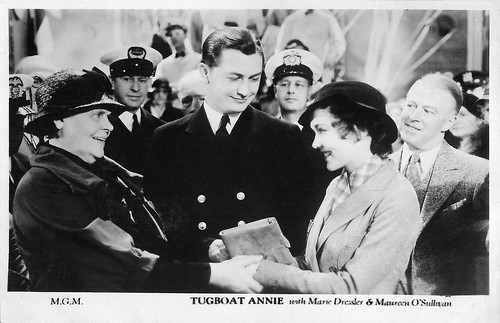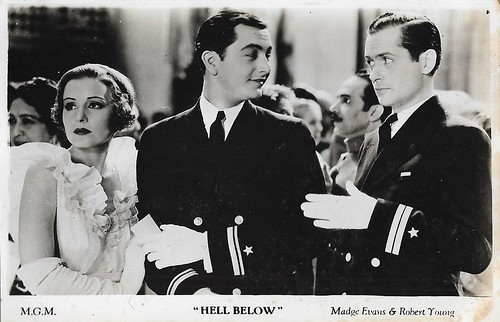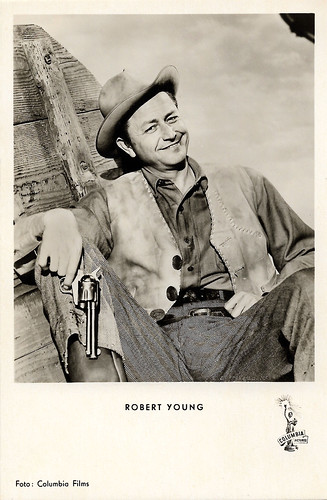
British `Real Photograph postcard, no. 93. Photo: Metro Goldwyn Mayer.

British Real Photograph postcard, no. 68. Photo: Metro-Goldwyn-Mayer.

British postcard in the Film Partners Series, London, no. PC 157. Photo: Metro Goldwyn Mayer. Robert Young and Betty Furness in The Band Plays On (Russell Mack, 1934).

French postcard by Editions P.I., Paris, no. 211. Photo: Metro Goldwyn Mayer.
Friendly, positive and charming characters
Robert Young was born in Chicago in 1907. His older brother Joe Young was later known as actor Roger Moore, a mainstay character actor who appeared in hundreds of uncredited roles in films. Their family relocated to Los Angeles when Robert was seven. He was introduced to acting while attending Lincoln High School.
After graduation, he pursued an acting career and from 1927 to 1931, he studied acting at the Pasadena Playhouse, where he gained his first acting experience. Sharpening his acting abilities while touring with a stock company in their production, 'The Ship', a talent scout saw him, resulting in a screen test.
After a few movie-extra roles, Young had his first credited film role in the Charlie Chan Mystery The Black Camel (Hamilton MacFadden, 1931). He was signed by MGM to play a bit part as Helen Hayes' son in Sin of Madelon Claudet (Edgar Selwyn, 1931). At the request of MGM head Irving Thalberg, Young's role was expanded during shooting, thus the young actor was launched on the road to stardom.
In the 1930s, he was able to establish himself in significant roles. He usually played friendly, positive and charming characters who sometimes seemed a bit boring though, which is why Young didn't always get the leading lady at the end of the film. However, he did get Constance Cummings in the comedy mystery Remember Last Night? (James Whale, 1935). He got the chance for a slightly different type of role when he was lent to England by MGM and played a likeable American who turns out to be a cold-blooded spy in the thriller Secret Agent (1936) directed by Alfred Hitchcock.
He then starred in another elaborate British production, It's Love Again (Victor Saville, 1936) with Jessie Matthews. In 1940, he had great success alongside James Stewart in The Mortal Storm (Frank Borzage, 1940) and alongside Spencer Tracy in Northwest Passage (King Vidor, Jack Conway, W.S. Van Dyke, 1940). A year later he had arguably one of his best film roles in the title role of King Vidor's drama H.M. Pulham, Esq. (King Vidor, 1941) in which he played a stiff middle-aged businessman who sums up wasted life opportunities.

German postcard by Ross Verlag, no. 6933/1, 1931-1932. Photo: Metro Goldwyn Mayer.

British postcard in the Filmshots series by Film Weekly. Photo: M.G.M. Marie Dressler, Robert Young and Maureen O'Sullivan in Tugboat Annie (Mervyn LeRoy, 1933).

British postcard in the Filmshots series by Film Weekly. Photo: M.G.M. Madge Evans, Robert Young and Robert Montgomery in Hell Below (Jack Conway, 1933).

British postcard in the Picturegoer Series, London, no. 679a. Photo: Metro Goldwyn Mayer.

British postcard in the Picturegoer Series, London, no. 679c. Photo: Gaumont British.
The wise and kind American family man
Although Robert Young never ranked among the superstars of classic Hollywood cinema, his film partners included famous colleagues such as Katharine Hepburn, Margaret Sullavan, Norma Shearer, Joan Crawford, Helen Hayes, Luise Rainer and Hedy Lamarr. After his contract with Metro-Goldwyn-Mayer ended, he worked as a freelance actor for various studios such as 20th Century Fox, United Artists and RKO Radio Pictures. This also allowed him to get away from his middle-class screen image a bit and play characters with darker sides.
His best-known films of the 1940s include the Oscar Wilde-based ghost comedy The Canterville Ghost (Jules Dassin, Norman Z. McLeod, 1944) with Charles Laughton, the Film Noir Crossfire (Edward Dmytryk, 1947) and the star-studded literary adaptation That Forsyte Woman (Compton Bennett, 1949), for which he briefly returned to MGM. Other interesting roles were the facially disfigured war veteran in The Enchanted Cottage (John Cromwell, 1945) and the no-good philanderer in They Won't Believe Me (Irving Pichel, 1947) with Susan Hayward.
In the 1950s, the cinema offers dwindled noticeably, but Young was to have a second career on television that surpassed his cinema successes. From 1954 to 1960, he achieved great popularity as insurance salesman and family father Jim Anderson in the family series Father Knows Best (1954-1963), which became one of the most successful US series of the 1950s. Young had already been voicing this character since 1949 in a radio series also titled 'Father Knows Best'. With his portrayal of Jim Anderson, Young shaped the ideal image of the wise and kind American family man. Young became a millionaire thanks to his part-ownership of Father Knows Best, which, despite a shaky beginning, ran successfully until 1960 Young ended the series at the height of its popularity, partly because he was increasingly bored with the role.
In 1961 and 1962 he played the lead role in the short-lived sitcom Window on Main Street. Young disappeared from Hollywood during most of the 1960s, reappearing in 1969 in the pilot film Marcus Welby, M.D. It became a hit television series for the next seven years, presenting him with his third Emmy for his portrayal of the doctor. Young's later TV work included one-shot revivals of Father Knows Best and Marcus Welby, and the well-received TV movie Mercy or Murder? (Steve Gethers, 1987), in which Young essayed the role of a real-life pensioner who killed his wife rather than allow her to endure a painful, lingering illness. Young won three Emmy Awards, twice for his role in Father Knows Best and once for Marcus Welby, MD. He also received a Golden Globe Award for Marcus Welby. Three stars have been dedicated to him on the Hollywood Walk of Fame since 1960 in the categories of film, television and radio.
Robert Young was married to Elizabeth 'Betty' Louise Henderson from 1933 until her death in 1994. They had met while they were both students at Lincoln High. He was the father of four daughters and grandfather of six grandchildren. Although he portrayed well-developed social characters on the silver screen, Young himself suffered from depression and alcoholism. He also suffered from a chemical imbalance that led to a suicide attempt in 1991. In 1998, he passed away from respiratory failure at his Westlake Village, CA, home at the age of 91. He was interred at Forest Lawn Memorial Park in Glendale beside his wife Betty.

British postcard in the Picturegoer Series, London, no. W 463. Photo: Metro-Goldwyn-Mayer.

Dutch postcard, no. 462. Photo: Metro Goldwyn Mayer (MGM). Helen Twelvetrees and Robert Young in Unashamed (Harry Beaumont, 1932).

British postcard by Milton Postcard, no. 93. Photo: Metro-Goldwyn-Mayer.

British collectors card in the Film Stars series by Player's Cigarettes (John Player & Sons, a branch of the Imperial Tobacco Co., Second Series, no. 50. Image: Metro-Goldwyn-Mayer (MGM).

West German postcard by Kunst und Bild, Berlin, no. A 611. Photo: Columbia. Robert Young in Relentless (George Sherman, 1948).
Sources: Donald Greyfield (Find A Grave), AllMovie, Wikipedia (German and Dutch) and IMDb.
No comments:
Post a Comment